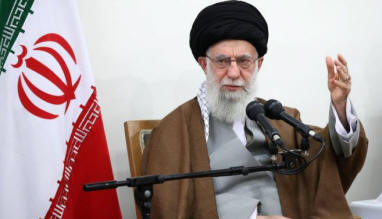|
Ayatollah Ali Khamenei is Iran's spiritual leader and its highest
authority - he has the final say over all government matters in the
country.
The 80-year-old cleric became Supreme Leader in 1989 after the death of
the Islamic Republic's founding father, Ayatollah Ruhollah Khomeini.
Since then, he has maintained a firm grip on Iran's politics and its
armed forces, and suppressed challenges to the ruling system, sometimes
violently.
Ayatollah Khamenei has also consistently taken hard-line stances on
external matters, including the ongoing confrontation with the United
States
Born in the north-eastern city of Mashhad in 1939, the son of a
religious scholar, Ali Khamenei studied at seminaries in his home city
before moving to the Shia holy city of Qom.
In 1962, he joined the religious opposition movement of Ayatollah
Khomeini against Shah Mohammad Reza Pahlavi.
The young Ali Khamenei became a devoted follower of Khomeini. According
to his own account, everything he has done and believes today is derived
from Khomeini's vision of Islam.
Ali Khamenei was actively involved in protests against the shah and was
imprisoned several times.
After the Islamic Revolution in 1979, Ali Khamenei served on the
Revolutionary Council, which ruled alongside the interim government. He
subsequently became deputy defence minister and helped organise the
Islamic Revolution Guard Corps (IRGC), which became one of Iran's most
powerful institutions
In June 1981, he was severely injured in a bomb attack on a mosque in
Tehran that was blamed on a leftist insurgent group. The incident left
him paralysed in his right arm.
Two months later, the same insurgent group assassinated Iran's
President, Mohammad-Ali Rajai. Ali Khamenei was elected to the succeed
Rajai and stayed in the then largely-ceremonial role for eight years,
often clashing with the then prime minister, Mir Hossein Mousavi, whom
he thought favoured too much reform to the Iranian system.
After the death of Khomeini in June 1989 the Assembly of Experts (a
council of clerics) chose Ali Khamenei to be the new Supreme Leader,
even though he had not achieved the required rank among Shia clerics
that the constitution stipulated - marja-e taqlid (source of emulation)
or grand ayatollah.
To rectify the situation, the constitution was amended to say the
Supreme Leader had to show "Islamic scholarship", enabling Ali Khamenei
to be selected. He was also elevated overnight from the clerical rank of
Hojjat al-Islam to ayatollah.
Iran's constitution was also changed to abolish the post of prime
minister and vest greater authority in the presidency
The four presidents that have served under Ayatollah Khamenei since then
have each posed challenges to his authority without undermining the
Islamic Republic.
Mohammad Khatami, a reformist, pushed for détente with the West and more
social and political freedom in Iran while in office between 1997 and
2005. But the supreme leader and his allies blocked many of his reforms.
Mr Khatami's conservative successor, Mahmoud Ahmadinejad, was seen by
some as a protégé of Ayatollah Khamenei. But he faced mounting criticism
over his government's management of the economy and foreign policy
decisions, and then fell out with the supreme leader after reportedly
trying to increase his own powers.
Mr Ahmadinejad's disputed re-election in 2009 also triggered the biggest
protests in Iran since the revolution. The supreme leader insisted the
result was valid and ordered a major crackdown on dissent that saw
dozens of opposition supporters killed and thousands detained
Hassan Rouhani, a moderate who took office in 2013, negotiated a
landmark nuclear deal with world powers with Ayatollah Khamenei's
blessing. But the supreme leader resisted the president's efforts to
expand civil liberties and overhaul the economy.
Mr Rouhani's failure to alleviate the economic hardship suffered by many
ordinary Iranians, which worsened significantly after the US abandoned
the nuclear deal in 2018 and reinstated sanctions on Iran, triggered
mass protests in November 2019. At the protests, people were heard
chanting "death to the dictator" - a reference to the supreme leader.
The unrest prompted a bloody crackdown by the security forces. Amnesty
International said more than 304 people were killed, while a Reuters
news agency report put the death toll at 1,500. The Iranian authorities
dismissed both figures
Ayatollah Khamenei also has final say on all aspects of Iran's foreign
affairs.
He has remained suspicious of relations with the West, particularly the
United States.
Back in 1981 when he was president, he set the tone for his leadership
by vowing to stamp out "deviation, liberalism, and American-influenced
leftists".
He did not oppose the 2015 nuclear deal, but has criticised President
Rouhani for negotiating it with the expectation that the US would uphold
it in the long term.
After Donald Trump's decision in 2018 to abandon the accord and
re-impose sanctions, the ayatollah told the US president that he "made a
mistake". He remarked: "I said from the first day: don't trust America
When the US killed the powerful Iranian general Qasem Soleimani - a
close ally and personal friend - in a drone strike in Iraq in January
2020, Ayatollah Khamenei promised "severe revenge".
He called Iran's retaliatory ballistic missile attacks on two Iraqi
bases hosting US forces a "slap on the face" for America. But he
stressed that "military action like this is not sufficient".
"What is important is ending the corrupting presence of America in the
region," he declared.
The supreme leader has also repeatedly called for the elimination of the
State of Israel.
In 2018, he described the country as a "cancerous tumour" that had to be
removed from the region.
He has also publicly questioned whether the Holocaust occurred. In 2014,
his Twitter feed quoted him as saying: "The Holocaust is an event whose
reality is uncertain and if it has happened, it's uncertain how it has
happened
In 2020, Ayatollah Khamenei and Iran's establishment have faced two
major crises.
The first began when the IRGC mistakenly shot down a Ukraine
International Airlines passenger plane near Tehran on 8 January, killing
all 176 people on board, many of them Iranian nationals.
A cover-up caused widespread anger, with hardline newspapers demanding
resignations, and there was a fresh wave of anti-government protests.
Security forces were accused of using live ammunition to disperse them.
In a rare sermon at Friday prayers, Ayatollah Khamenei said his "heart
burned" for the victims of the plane downing. But he also defended the
military and accused Iran's enemies of seeking to capitalise on the
tragedy
In February, Iran was struck by an outbreak of the new coronavirus
disease.
Ayatollah Khamenei initially played down the threat of the coronavirus,
saying it was being exaggerated by Iran's enemies as a scare tactic.
"The issue is an issue that will pass. It's not something
extraordinary," he said.
Given that Ayatollah Khamenei's age, together with health problems he
has suffered in recent years, the question of who might succeed him as
supreme leader is the subject of endless speculation.
He reportedly favours the hardline cleric Ebrahim Raisi, a defeated
presidential candidate in 2017 who was appointed head of the judiciary
last year. When the time comes, the Assembly of Experts will elect his
replacement |


